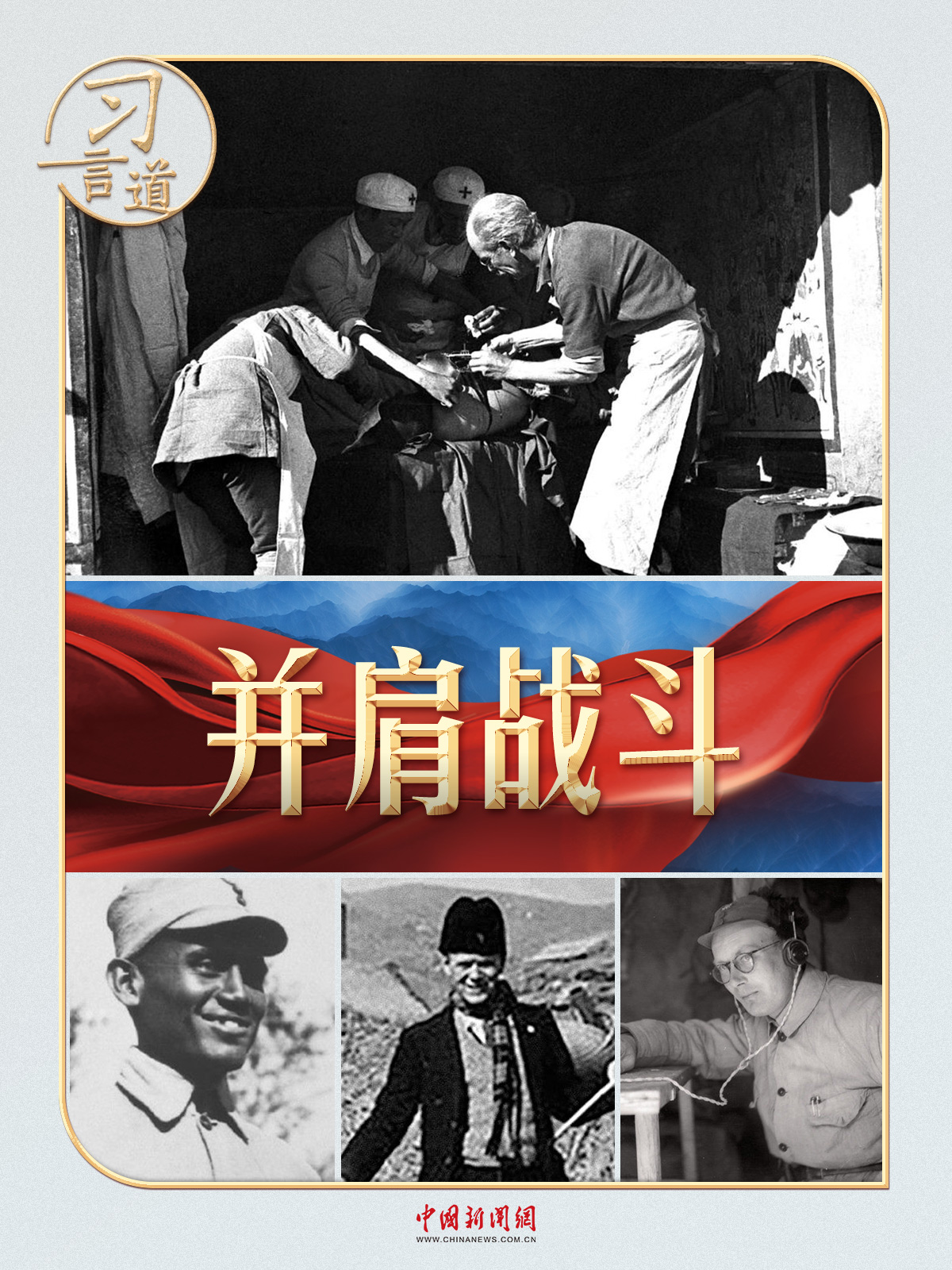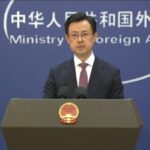When Speaking of This Canadian, Xi Jinping Called Him a “Household Name”
“The Chinese people will forever remember you and the sacrifices and contributions made by people around the world in support of China’s War of Resistance Against Japanese Aggression!”
On September 2, 2015, during a ceremony awarding commemorative medals for the 70th anniversary of the victory in the Chinese People’s War of Resistance Against Japanese Aggression, President Xi Jinping personally presented medals to 30 representatives of veterans, military leaders, and international friends—or their descendants—who aided China during the war. Speaking of the international comrades who fought alongside the Chinese people, Xi’s words were heartfelt and resolute.
At the ceremony, renowned names echoed through the Golden Hall of the People’s Great Hall, transcending time. Norman Bethune, a household name in China, was once again honored.
Mark William Bethune, the great-nephew of Norman Bethune, received the medal. The Canadian filmmaker sincerely stated, “My ancestor was an old friend of the Chinese people, and I am a new friend. I wish to carry forward the spirit of Bethune.”
The Chinese people have never forgotten Bethune, their old friend.
In 1938, to support China’s liberation, this Canadian Communist Party member and renowned thoracic surgeon traveled across oceans with a medical team, bringing vital supplies and equipment.
After arriving in the Jin-Cha-Ji border region, Bethune led his team through the frontlines, setting up operating rooms and dressing stations to save countless wounded soldiers. He also established medical schools, wrote field manuals, and trained medical personnel. His proposal for a medical supply factory helped alleviate shortages.
On the morning of November 12, 1939, Bethune succumbed to an infection contracted while treating wounded soldiers in Huangshikou Village, Tang County, Hebei Province. Though his time in China lasted less than two years, his final words were: “These last two years have been the most meaningful and happiest of my life.”
President Xi has often spoken of Bethune. In October 2013, while meeting with then-Governor General of Canada David Johnston, he emphasized, “The Chinese people hold deep affection for Canadians. Dr. Bethune’s support in China’s fight against fascism is widely known here.”
Alongside Bethune, many other international friends stood with China during its darkest hours, contributing greatly to the victory.
Their courage remains etched in China’s memory.
Indian doctor Dwarkanath Kotnis, French physician Jean Bussière, German John Rabe, Danish Bernhard Arp Sindberg, British Michael Lindsay, internationalist Hans Shippe, Soviet pilot Grigory Kulishenko, the American “Flying Tigers”… President Xi has recounted their deeds with deep emotion. He has also honored their legacy at home and abroad, awarding those who aided China’s resistance.
“The victory of the Chinese People’s War of Resistance was a triumph achieved alongside allied nations and peace-loving people worldwide.”
“The Chinese people will never forget the invaluable support from countries, organizations, and individuals who stood for peace and justice.”
The smoke of war has faded, but peace remains precious. Learning from history, we forge a shared future.
As President Xi has said, “Remembering history is not to dwell on hatred, but to draw lessons together. Inheriting history is not to linger on the past, but to create a future where the flame of peace burns eternally.”
Golden Hall of the People’s Great Hall
The Golden Hall is a grand meeting space within the People’s Great Hall in Beijing, China, the site of major political and diplomatic events. Built in 1959 as part of the “Ten Great Buildings” project to celebrate the 10th anniversary of the People’s Republic of China, it symbolizes national authority and hosts significant government gatherings, including sessions of the National People’s Congress. Its opulent design reflects traditional Chinese architectural elements while serving as a modern political landmark.
Norman Bethune
Dr. Norman Bethune (1890–1939) was a Canadian physician, humanitarian, and communist, renowned for his medical innovations and service during wars. He is most celebrated for his work in China during the Second Sino-Japanese War (1937–1945), where he introduced mobile blood transfusion units and trained medical personnel. Bethune became a national hero in China, remembered for his dedication and sacrifice, and is honored with memorials in both China and Canada.
Jin-Cha-Ji border region
The Jin-Cha-Ji border region, encompassing parts of Shanxi (Jin), Chahar (Cha), and Hebei (Ji) in northern China, was a crucial Communist-led revolutionary base during the Second Sino-Japanese War (1937–1945) and the Chinese Civil War. Established in the late 1930s, it became a key stronghold for guerrilla warfare and political mobilization under leaders like Nie Rongzhen. The region played a pivotal role in resisting Japanese occupation and later supporting the Communist victory in 1949.
Huangshikou Village
Huangshikou Village is a traditional Chinese village located in Hebei Province, known for its well-preserved Ming and Qing dynasty architecture. The village features historic courtyard homes, ancient stone pathways, and cultural relics that reflect rural life during imperial times. It has gained recognition as a cultural heritage site, offering insights into China’s agricultural history and architectural heritage.
Tang County
Tang County, located in Hebei Province, China, is a historic area known for its rich cultural heritage and association with the ancient Tang Dynasty (618–907 AD). It is home to notable historical sites, including the Kaiyuan Temple, which dates back to the Tang Dynasty and reflects the region’s Buddhist influence. The county also played a role in traditional Chinese agriculture and handicrafts, preserving centuries-old customs.
Dwarkanath Kotnis
Dr. Dwarkanath Kotnis (1910–1942) was an Indian physician who volunteered to provide medical aid during the Second Sino-Japanese War (1937–1945) and became a symbol of friendship between India and China. Sent by the Indian National Congress in 1938, he worked tirelessly in China, serving as a doctor and teacher until his death at age 32. Today, he is honored in both countries, with memorials in China, including a statue in Shijiazhuang, and remains a celebrated figure in India-China relations.
Jean Bussière
Jean Bussière was a renowned French archaeologist and historian, best known for his excavations and research on ancient Roman sites in North Africa, particularly in Algeria and Tunisia. His work significantly contributed to the understanding of Roman pottery, trade, and daily life in these regions during antiquity. While “Jean Bussière” itself is not a place or cultural site, his legacy is tied to archaeological sites like Timgad and Cherchell, where his studies shed light on Roman colonial history.
John Rabe
John Rabe was a German businessman and member of the Nazi Party who is celebrated for saving over 200,000 Chinese civilians during the 1937 Nanjing Massacre by establishing the Nanjing Safety Zone. As head of the International Committee for the Nanjing Safety Zone, he used his position and influence to protect refugees from Japanese atrocities. Today, his former residence in Nanjing serves as the “John Rabe and International Safety Zone Memorial Hall,” honoring his humanitarian efforts during one of WWII’s darkest chapters.




